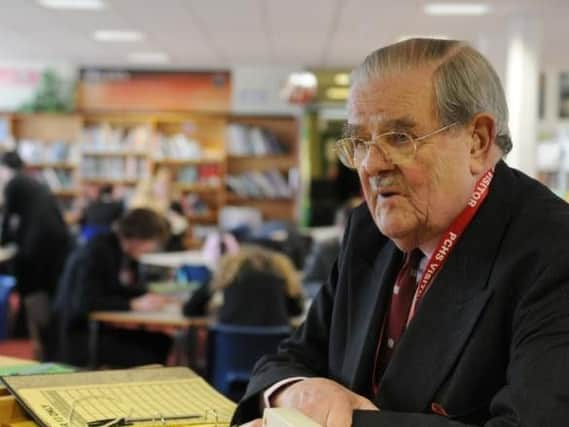Obituary: Tributes to Northumberland peer who was a medical pioneer


Amongst many national and international achievements, honours and awards, his esteemed research and career were recognised in 2014 with the creation of the John Walton Muscular Dystrophy Research Centre at Newcastle University, which supports world-leading research in this field.
He was created a life peer in 1989 as Baron Walton of Detchant, which is located near Belford.
Advertisement
Hide AdAdvertisement
Hide AdLord Walton, who was President of Bamburgh Castle Golf Club, died on Thursday at the age of 93.
Among those who have paid tribute is Lord Beith, former MP for the Berwick-upon-Tweed constituency.
He said: “John Walton was a medical scientist of great distinction who continued to speak on medical issues in the House of Lords with clarity and authority when well into his 90s, and at the same time he was an active member of the community in north Northumberland and a friend to so many people in our area.
“I first got to know him when we were colleagues at Newcastle University, where he was Dean of Medicine, and it was a friendship renewed in recent years in Parliament.
Advertisement
Hide AdAdvertisement
Hide Ad“He was very proud of his origins in a County Durham Methodist family and shared with his late and beloved wife a love for music, alongside his passion for golf which must have been one of the ways through which he kept so fit and active until only weeks ago. His was a life to celebrate and admire.”
Lord Walton’s first speech in the House of Lords focused on the Human Fertilisation and Embryology Bill. Most recently, he was involved with the debate surrounding mitochondrial research.
Vice Chancellor of Newcastle University, Professor Chris Brink, said: “Newcastle University mourns the death of Lord Walton, but we celebrate his life and achievements as an alumnus, professor and Dean, a mentor of many, an example to all, and a lifelong friend and supporter of the university.
“John, as he insisted on being called, could till the end amaze and impress us with his clear thinking, eloquence, wit, wisdom, knowledge and experience. He will be sadly missed, but long remembered, with gratitude, affection and admiration.”
Advertisement
Hide AdAdvertisement
Hide AdBorn in 1922 in Rowlands Gill, a mining village on the River Derwent, Lord Walton was the son of two schoolteachers and grandson of a miner.
At the age of 18, he was denied entry into the RAF on the grounds that his impending medical education was crucial to Britain’s World War II efforts and so later commenced his studies at King’s College Newcastle, then part of Durham University, in 1941.
Qualifying from a shortened wartime course, Lord Walton graduated with a first-class honours degree in 1945 and started work at Newcastle’s Royal Victoria Infirmary (RVI).
He was called into the Army in 1947, serving first as Embarkation Medical Officer in Glasgow and later Southampton, then becoming Second-in-Command of the Hospital Ship Oxfordshire.
Advertisement
Hide AdAdvertisement
Hide AdFollowing completion of his military service, Lord Walton returned to the RVI as medical registrar. It was while studying for his medical doctorate that he found himself inspired by three leading physicians: Professor Fred Nattrass, Professor – later Sir – James Spence and Dr Henry Miller.
Lord Walton would later work alongside Professor Nattrass, the pair combining detailed clinical and genetic data which led to the first major classification of muscular dystrophies.
Lord Walton became a consultant neurologist in 1958 and then Professor of Neurology at Newcastle University in 1968.
In 1971, he was appointed Dean of Medicine – a position he held for 10 years – and in his autobiography The Spice of Life, he described it as the most enjoyable and fruitful decade of his professional career.
Advertisement
Hide AdAdvertisement
Hide AdDuring this time he became a Knight Bachelor and became Sir John.
His love for Newcastle and Northumberland were never forgotten and in 1980 he was honoured again when the City of Newcastle upon Tyne, commemorating its 900th anniversary, made him an Honorary Freeman.
In addition to these honours, Lord Walton would also hold a number of senior positions from the 1980s onwards.
He was elected as President of the British Medical Association from 1980 to 1982, President of the General Medical Council from 1982 to 1989 and President of the Royal Society of Medicine from 1984 to 1986.
Advertisement
Hide AdAdvertisement
Hide AdLord Walton also held the positions of President of the Association of British Neurologists (1987–88) and President of the World Federation of Neurology (1989–97), among other titles.
He served as Warden of Green College from 1983 to 1989 and in 1989, during his tenure at Green College, Sir John became Lord John Walton of Detchant.
In the House of Lords, he was a member of the Medical Ethics Select Committee, Science and Technology Committee and various sub committees.
In recognition of his long and distinguished career, Lord Walton received the Gold Medal of the Royal Society of Medicine 2014.
Advertisement
Hide AdAdvertisement
Hide AdAs well as his connection with Bamburgh Castle Golf Club, he held a season ticket for his beloved Newcastle United and supported Durham County Cricket Club. He was also a regular theatre goer and supporter of the arts.
Lord Walton leaves three children and extended family.